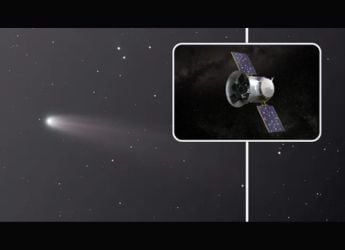- Home
- Science
- Science News
- CERN's ALPHA Experiment Achieves Precise Antihydrogen Measurement
CERN's ALPHA Experiment Achieves Precise Antihydrogen Measurement
A breakthrough in antimatter research, ALPHA’s refined antihydrogen study accelerates precision physics.

Photo Credit: CERN
Antimatter research advances with new precision measurements by international CERN team.
Efforts to study antimatter have progressed with new precision measurements conducted by an international team of researchers at CERN. The ALPHA experiment has been focused on antihydrogen, the antimatter counterpart of hydrogen, to understand its fundamental properties. The latest findings have allowed scientists to measure an electronic transition in antihydrogen with increased accuracy, which could help determine whether antimatter behaves in accordance with established physics principles. These results mark a significant step in comparing antihydrogen to hydrogen, which has been extensively studied.
Findings from the ALPHA Experiment
According to a study published in Nature Physics, the ALPHA collaboration has measured the 1S–2S transition in antihydrogen atoms using improved techniques. This transition, an electronic energy shift, has been observed in both accessible hyperfine components, providing new insights into the internal structure of antihydrogen. The research has employed laser cooling methods, which have helped narrow spectral measurements by reducing atomic motion.
In a statement to Phys.org, Jeffrey Scott Hangst, spokesperson for the ALPHA collaboration, stated that the ability to produce, confine, and study antihydrogen remains unique to their research team. Hangst noted that these advancements allow for comparisons between hydrogen and antihydrogen at an unprecedented level of precision.
Impact of New Techniques
A key achievement of the experiment has been the reduction in the time required to conduct these measurements. Previous studies on the same transition took approximately ten weeks, whereas the new approach enables data collection within a day. This improvement has been attributed to the accumulation of antihydrogen atoms and refined measurement techniques. Hangst explained that this progress allows for repeated measurements, enhancing the stability and reliability of results.
Future Research and Implications
Further studies are expected to refine these measurements, with researchers aiming to match the precision achieved in hydrogen studies. The long-term objective is to determine if antimatter follows the same physical laws as matter. If significant differences are found, they could challenge current understandings of fundamental physics. The next phase of research is set to build upon these findings, with results anticipated later this year.
Get your daily dose of tech news, reviews, and insights, in under 80 characters on Gadgets 360 Turbo. Connect with fellow tech lovers on our Forum. Follow us on X, Facebook, WhatsApp, Threads and Google News for instant updates. Catch all the action on our YouTube channel.
Related Stories
- Samsung Galaxy Unpacked 2025
- ChatGPT
- Redmi Note 14 Pro+
- iPhone 16
- Apple Vision Pro
- Oneplus 12
- OnePlus Nord CE 3 Lite 5G
- iPhone 13
- Xiaomi 14 Pro
- Oppo Find N3
- Tecno Spark Go (2023)
- Realme V30
- Best Phones Under 25000
- Samsung Galaxy S24 Series
- Cryptocurrency
- iQoo 12
- Samsung Galaxy S24 Ultra
- Giottus
- Samsung Galaxy Z Flip 5
- Apple 'Scary Fast'
- Housefull 5
- GoPro Hero 12 Black Review
- Invincible Season 2
- JioGlass
- HD Ready TV
- Laptop Under 50000
- Smartwatch Under 10000
- Latest Mobile Phones
- Compare Phones
- Redmi Turbo 5
- Redmi Turbo 5 Max
- Moto G77
- Moto G67
- Realme P4 Power 5G
- Vivo X200T
- Realme Neo 8
- OPPO Reno 15 FS
- HP HyperX Omen 15
- Acer Chromebook 311 (2026)
- Lenovo Idea Tab Plus
- Realme Pad 3
- HMD Watch P1
- HMD Watch X1
- Haier H5E Series
- Acerpure Nitro Z Series 100-inch QLED TV
- Asus ROG Ally
- Nintendo Switch Lite
- Haier 1.6 Ton 5 Star Inverter Split AC (HSU19G-MZAID5BN-INV)
- Haier 1.6 Ton 5 Star Inverter Split AC (HSU19G-MZAIM5BN-INV)
-
 CERN Experiments Confirm Early Universe Behaved Like a Near-Perfect Fluid
CERN Experiments Confirm Early Universe Behaved Like a Near-Perfect Fluid
-
 NASA’s TESS Captures First Images of Rare Interstellar Comet 3I/ATLAS
NASA’s TESS Captures First Images of Rare Interstellar Comet 3I/ATLAS
-
 Daredevil: Born Again Season 2 OTT Release Date Confirmed: When and Where to Watch it Online?
Daredevil: Born Again Season 2 OTT Release Date Confirmed: When and Where to Watch it Online?
-
 The Wrecking Crew Starring Jason Momoa and Dave Bautista Now Streaming: What You Need to Know
The Wrecking Crew Starring Jason Momoa and Dave Bautista Now Streaming: What You Need to Know












